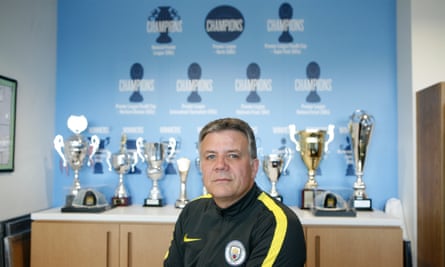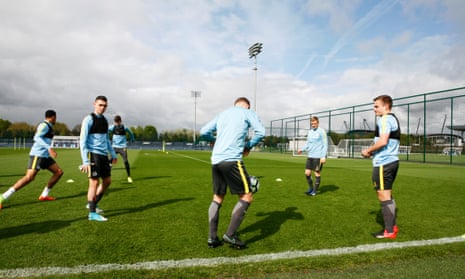There is a buzz among Lee Carsley’s players as they prepare for Wednesday night’s FA Youth Cup final second leg against Chelsea at Manchester City’s football academy. Light rain falls as the manager plots how to turn last week’s 1-1 draw into triumph over the Stamford Bridge club at the third attempt, after the team lost out in 2015 and 2016.
Carsley took charge of the Under-18s last summer, when Jason Wilcox was promoted to head of coaching. The former Everton and Republic of Ireland midfielder has guided the team to the Northern Premier League title, while Chelsea claimed the Southern Premier League version and head the national Premier League standings – City trail by five points and sit sixth – and are, according to City’s young captain, Ed Francis, “the best side we’ve played”.
The Guardian was granted the first behind-closed-doors access to the under-18s and Carsley quips with tongue firmly in cheek: “There are no secrets here – we get forward as quick as possible, play 4-4-2.”
All of City’s age groups, from under-nine to Pep Guardiola’s senior team, operate in a 4-3-3 formation and Mark Allen, the academy director since Sheikh Mansour bought City in 2008, outlines the reasons. “We were playing 4-3-3 eight years ago. Hopefully practice makes perfect so you become so good at it the opposition know you’re going to do it but they’ve still got to stop it,” he says.
“We believe it’s the best mechanism to learn, in terms of attacking and how to press without the ball. In time we might refine that. What might change is the shape but I can’t see the philosophy changing in terms of how we play.”
The p-word can be an empty term in football but Allen offers a detailed breakdown of what it means at City. “Our philosophy is this – we work over six phases – from buildup all the way through to defending the box. There’s a very succinct programme in place for the steps through those phases on a week-by-week basis. And it starts young.
“When we start educating the youngsters at 10 you’ll see them play out from the back and they’ll lose the ball and concede goals: it doesn’t matter. Then when all the units link and inter-link, those come into the play. If you look at the syllabus you’d be able to say ‘right, week 27 is defending as a block’ and the academy will be working on defending as a block.”

As well as a Guardiola’s trophy-laden CV, his record of blooding youngsters was a factor in his appointment. The defender Tosin Adarabioyo, a 19-year-old Mancunian, has made three appearances for him already, while the Stockport-born midfielder Phil Foden was on the bench for City’s Champions League game with Celtic in December, aged 16 and 193 days. Foden has been at City since he was nine and scored against Chelsea in the Youth Cup final first leg.
“When I set out, the technical level wasn’t as good as I thought it should be. Over the years we’ve really fixed that,” Allen says. “We can comfortably put our team against anybody in Europe or the world and say ‘we can handle the ball’. I’ve always believed if you’re an eight-year-old Portuguese, Spanish, Italian or British kid you’re the same. It’s what you do with them.
“The fans would love to see a local boy come through and I would love to do that. The fact there was eight in the starting XI against Chelsea [for last week’s first leg] says a lot in terms of their level as City could go to Europe and recruit.”
City have not developed an established first-team player from the UK since Micah Richards’ breakthrough in 2005, though Adarabioyo’s progress means he is close to breaking the sequence.
Allen states he always believed it would take a decade to produce a consistent supply of first-team footballers. Next year is his 10th as the academy director and he says: “We’re right on [for] that. It takes 10 years to build something solid that’s just not the odd player. It’s a production line of quality – you won’t have 11 players every year but there will be some form of production line that you could pick one from that group, and two from there, and three from that group. I’ve got to be ready for when the manger says ‘I need one’. That’s my challenge – to say ‘there’s one’, and he compares favourably’”
Francis, the captain who comes from Poynton in Cheshire, says: “Composure is a big thing I’ve learned at City. They drill it into us that we have to have confidence on the ball.”
Guardiola is kept informed about developments, and the first-team manager watched the under-18s play Chelsea. “Every single weekend Pep gets highlights of our games. So he’s very conscious of our players and a number are training on a regular basis with the first team,” Allen says. “We all know it will get better. This is Pep’s first year, his background in wanting to promote youth is definitely there. I think it’s just time now.”
Guardiola has said he may take a group of juniors on the summer tour of the US. “That may happen – just to see what they’re like in that environment,” Allen says, “because the top end of development is mental. Mental is about at what point do you run out of the ability to adapt to the quicker and more physical demands of the highest level. From what I’ve seen this year, a number of our boys will cope with it.”
Allen admits finding opportunity to expose them to this is his greatest challenge. “That’s the bit where we experimented a little more in terms of loans to get them used to man’s football,” he says of young players who have moved on a temporary basis, including the 20-year-old Bersant Celina (to Twente), the 22-year-old Shay Facey (Heerenveen), and the 19-year-old Manu García (Breda). “We’ve got to get them closer to the environment, so they can say ‘I’m ready as I’ve seen this before.’ It’s very exciting and the great thing is I’ve been very fortunate I’ve been granted time. The early days were painful because we were changing from big physical lads and were perhaps losing games because of physicality.”

Not any more. The success overseen by Allen is impressive. His office has a sideboard laden with trophies already won this season. It includes seven champions trophies – the National Premier League Under 18s, Premier League North Under-18s, Premier League Floodlit Cup Super Final Under-15s, Premier League Floodlit Cup Northern Division Under-15s, Premier League International Tournament Under-13s, Premier League National Finals Under-11s, and Premier League National Futsal Under-10s.
Behind Allen’s desk in block white capital letters is a floor-to-ceiling mission message of what a City player should be. It begins: “The early riser, the first to the training ground”; discusses “the drinks declined, the question dodged, the closed ranks”; and finishes with: “The trophy lifted, the history made, the reason to get up in the morning.”
Allen’s appointment is illustrative of City’s forward-thinking, with a football and business hinterland bringing a varied perspective to his role. Now 54, he was released by Swindon Town as a young player, took a football scholarship and business and accountancy degree at college in San Diego, then returned to the UK at 24.
“I branched out into the business world then,” he says, “and ended up as MD of MTV’s broadcast division for 13 years, based in Camden. My break back into football came because someone who knew my background put my name forward, and said: ‘Look if you’re thinking of a different way, maybe someone who’s a bit more rounded, then here is someone.’” Allen’s vision is to keep on improving his centre of excellence and try to harness the dreams of the 25-30 youngsters in each of age groups from under-nines to under-23s.
Francis first walked into City at six years of age and 11 years later the centre-back could help City lift their third FA Youth Cup. “Since a young age this is the life I’ve wanted to live. I wanted to be the best at what I’m doing,” he says. “The Champions League or World Cup – if I could win one of those two that would be the ultimate.”
City’s academy gives Francis and every other hopeful the foundation and a once-in-a-lifetime chance to dream big. The rest is up to them.


Comments (…)
Sign in or create your Guardian account to join the discussion